  |
Worm in the Apple
German Traitors and Other Influences
That Pushed the World Into War:
The little-known story of the men who destroyed Adolf Hitler's Germany
Friedrich Lenz
4. Major camps of the opposition,
their plans for a coup, and measures taken
These opponents were divided into two major camps: One, the numerically superior group,
confined themselves to the usual negative criticism of the measures introduced by the new
system,
to the peddling of rumors and cheap jokes, and to ongoing, petty disputes with Party and
organizational functionaries. In some cases they also formed
groups of like-minded opponents
who spent their time thinking up schemes for hampering or actually combating the system, but
who did not take action themselves.
On the whole, all these attempts did not pose any danger to the system, and were quite
insignificant in terms of what harm they did. Certainly it would have been better if these groups
had instead engaged in objective activity or positive criticism or in the judicious use of the
'emergency brake', in the interests of the nation. But the government of any state must expect a
certain part of the population to take a negative instead of a positive attitude, without posing any
actual threat to the continued existence of the governing system in question.
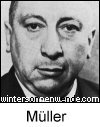 The other camp of the opposition was numerically inferior, but of much greater
importance. It was made up of influential politicians
or high-ranking military officers who were
either already retired from active service and hence
felt a pent-up need for action, or who still retained
their exalted positions and were dissatisfied for reasons of insufficient recognition and praise,
and
thus also looked for additional political activity. These circles were the source of the actual
antagonists. In political respects, these included: Secretary of State E. v.
Weizsäcker, the two brothers Erich and Dr. Theo Kordt The other camp of the opposition was numerically inferior, but of much greater
importance. It was made up of influential politicians
or high-ranking military officers who were
either already retired from active service and hence
felt a pent-up need for action, or who still retained
their exalted positions and were dissatisfied for reasons of insufficient recognition and praise,
and
thus also looked for additional political activity. These circles were the source of the actual
antagonists. In political respects, these included: Secretary of State E. v.
Weizsäcker, the two brothers Erich and Dr. Theo Kordt 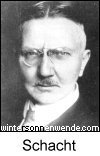 (the former in a decisive position in the Foreign Office, the
latter with the German Embassy in London), Dr. Schacht and Dr. Karl Goerdeler as well as the
former Gestapo officer H. B. Gisevius, Dr. Josef Müller and the former German
Ambassador to Rome, v. Hassel; in military respects: the two General Staff army officers
Beck and Halder, the Chief of Defense, Admiral Canaris and
his right-hand man, Major General
Oster, as well as Fabian von Schlabrendorff, Major General v. Tresckow, and Colonel Count v.
Stauffenberg. (the former in a decisive position in the Foreign Office, the
latter with the German Embassy in London), Dr. Schacht and Dr. Karl Goerdeler as well as the
former Gestapo officer H. B. Gisevius, Dr. Josef Müller and the former German
Ambassador to Rome, v. Hassel; in military respects: the two General Staff army officers
Beck and Halder, the Chief of Defense, Admiral Canaris and
his right-hand man, Major General
Oster, as well as Fabian von Schlabrendorff, Major General v. Tresckow, and Colonel Count v.
Stauffenberg.
The field of home affairs, however, was an insufficient arena for their drives,
since National-Socialist revolutionary methodology left little scope for earning laurels here if
one was not willing to content oneself with the objective 'use of the emergency brake'. And so
this
group chose instead the most interesting field where they could actually harm the
system, ie. Hitler - the field of foreign affairs. After all, this had the added benefit that 'the broad
masses didn't understand it', in other words, that these activities were reserved for an exclusive
circle of select men. These considered their activities to be all the more important because, in
their
opinion, foreign affairs were above the heads of not only the 'masses' but also of the government
elected by these 'masses' (the people). Hitler, like the Pied Piper of Hamelin, might be capable of
seducing an 'uncritical' majority into giving him their votes, but the conduct of foreign affairs did
require a bit more than that. And only they were born and called to do that! They, the
elite!
And since there was that bothersome thing called conscience, that insisted on stirring every now
and then, they created distractions for it: 'world peace'
and 'humanity' - in whose interests it was acceptable to do things one could never have done in
the
interests of the Fatherland.
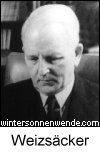 The central idea of these opponents is best expressed
in the following statement, made by the former Secretary of State in the Foreign Office, v.
Weizsäcker, the foremost 'expert' among the plotters. This was recorded in his memoirs,
and must be considered very carefully: "Before and during the War I personally always felt
morally entitled and bound to act behind the backs of Hitler and Ribbentrop to pass on to the
potential political adversary such political news as would help to keep the outbreak and the
escalation of the war in check, regardless whether these news were political secrets or not. It was
my goal to keep the potential enemy from becoming an enemy in fact." The central idea of these opponents is best expressed
in the following statement, made by the former Secretary of State in the Foreign Office, v.
Weizsäcker, the foremost 'expert' among the plotters. This was recorded in his memoirs,
and must be considered very carefully: "Before and during the War I personally always felt
morally entitled and bound to act behind the backs of Hitler and Ribbentrop to pass on to the
potential political adversary such political news as would help to keep the outbreak and the
escalation of the war in check, regardless whether these news were political secrets or not. It was
my goal to keep the potential enemy from becoming an enemy in fact."
Now it really was not very nice of the 'enemies in fact' to reward him for his valuable, altruistic
help with seven years' imprisonment, and a pity that fate did not let him live long enough to
enjoy
the fruits of his labors. That's what happens when one confuses the 'machinery' to be sabotaged
with that to be polished.
Besides this activity on the foreign policy scene, the conspirators worked on their other big plan:
to
carry out, as soon as possible, that little murder that would free the German people of the
Führer who regularly gave ever so many proofs of his incompetence in matters of both
domestic and foreign policy and who clearly had no dearer wish than to
plunge the peace-loving and altruistic world into war as soon as he possibly could. I will spare
myself the account of all the preparatory details, for there is, thank God, an extensive literature
on
this subject, in which the heroes brag about their deeds. We owe Herrn Gisevius many thanks for
doing this even at the risk of "deglorifying some of the participants".
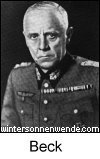 The Head of the conspiracy was Ludwig Beck, the Chief of General Staff
himself, who had left
as early as 1938 because he could not get along with Hitler, that "megalomaniac little private
first
class". He could not take it that his politically biased memos had not received enough
attention.14 Since he could not 'stay inside', he saw to a proper replacement for
himself,
in the person of Franz Halder. The result was comprehensive plans for a coup as well as various
sorts of foreign affairs operations, summarized as follows: The Head of the conspiracy was Ludwig Beck, the Chief of General Staff
himself, who had left
as early as 1938 because he could not get along with Hitler, that "megalomaniac little private
first
class". He could not take it that his politically biased memos had not received enough
attention.14 Since he could not 'stay inside', he saw to a proper replacement for
himself,
in the person of Franz Halder. The result was comprehensive plans for a coup as well as various
sorts of foreign affairs operations, summarized as follows:
IN PEACETIME:
1. In the summer of 1938, General Beck, who was then
Chief of Army General Staff, together with his successor, General Franz Halder, Secretary of
State
v. Weizsäcker, Dr. Karl Goerdeler, 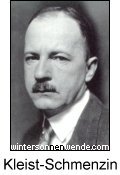 Admiral Canaris and Colonel Oster, made
preparations for a coup timed for mid-September. In an attempt to enlist foreign aid, Beck
informed the British government of the plan and its most important details. In August 1938, after
a discussion with Canaris, Beck sent the former Head of the Conservative Union,
Ewald von Kleist-Schmenzin, to London with the appropriate orders. Kleist stayed in London
from the 19th to the 24th of August 1938 and met with Sir Robert Vansittart, who informed the
government, and with Lord Lloyd and Winston Churchill. Admiral Canaris and Colonel Oster, made
preparations for a coup timed for mid-September. In an attempt to enlist foreign aid, Beck
informed the British government of the plan and its most important details. In August 1938, after
a discussion with Canaris, Beck sent the former Head of the Conservative Union,
Ewald von Kleist-Schmenzin, to London with the appropriate orders. Kleist stayed in London
from the 19th to the 24th of August 1938 and met with Sir Robert Vansittart, who informed the
government, and with Lord Lloyd and Winston Churchill.
Witnesses: Germans: 1. General Halder, 2. Dr. Rud. Pechel, 3. Dr.
Hans-Bernd Gisevius; foreign: 1. Mr. Jan Colvin (Gollancz Publishers, London), 2. Lord
Halifax, 3. Winston Churchill.
Other documentary material: 1. Halder's testimony in Nuremberg, 2. Halder's testimony
before the Denazification Court in Munich, 3. personal communication between Halder and the
author of the book Gespräche mit Halder.
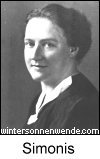 2. On September 5,
1938, Secretary of State v. Weizsäcker instructed Dr. Theo Kordt, chargé
d'affaires
in London, to inform the British government of the planned coup. The message was conveyed by
Frl. Susanne Simonis. The instructions were carried out in the night of
September 5-6, 1938 in a secret meeting between Dr. Kordt and the British Foreign Secretary,
Lord Halifax. 2. On September 5,
1938, Secretary of State v. Weizsäcker instructed Dr. Theo Kordt, chargé
d'affaires
in London, to inform the British government of the planned coup. The message was conveyed by
Frl. Susanne Simonis. The instructions were carried out in the night of
September 5-6, 1938 in a secret meeting between Dr. Kordt and the British Foreign Secretary,
Lord Halifax.
Witnesses: Germans: 1. Dr. Theo Kordt, 2. Frl. Susanne Simonis (presently with the
State
Department in Bonn), 3. Dr. Erich Kordt; foreign: 1. Mr. Philipp
Conwell-Evans (London), 2. Lord Halifax.
Other documentary material: 1. Dr. Kordt's book Nicht aus den Akten, 2.
Secretary of State v. Weizsäcker, Erinnerungen.
3. Shortly before the intended putsch, approximately on
September 12 or 13, 1938, Chief of General Staff General Halder instructed his confidante,
Lieutenant-Colonel
Hans W. Boehm-Tettelbach, to fly to London in order to apprise the British government again of
the planned coup, and to request their help. The message was given to Sir Robert
Vansittart.
Witnesses: Germans: 1. Major General
H. W. Boehm-Tettelbach, 2. General Franz Halder; foreign: 1. Sir Robert Vansittart,
London.
Other documentary material: 1. Halder's testimony at Nuremberg, 2. Halder's testimony
at
the Denazification Court.
4. In the summer of 1939, Lieutenant-Colonel
Hans Boehm-Tettelbach
again visited London on the orders of Halder and Canaris.
Witnesses: as for no. 3., as well as Mr. Jan Colvin.
5. A few weeks later, approximately in August 1939,
another General Staff officer, General Count Schwerin, visits London on the same
instructions.
Witnesses: as for no. 4.
6. In December 1938, Dr. Schacht informs Montagu
Norman, President of the Bank of England, of the coup situation in Germany and particularly of
the attitude of the Generals. The report was submitted to the British government.
Witnesses: Dr. Schacht and Dr. Gisevius.
7. In August 1939, as before in 1937 and 1938, Dr.
Goerdeler negotiates with intermediaries of the British government in London about British
support of the German coup.
Evidence: 1. Article "Entschleierter Mythos" by Georg Alexander, in the newspaper
Hannoversche Presse, July 18, 1947, 2. Hans Rothfels' book Die deutsche Opposition
gegen Hitler.
8. In late August 1939, Fabian v. Schlabrendorff, author of
the book Offiziere gegen Hitler, apprises Winston Churchill and Lord Lloyd in London
about the political situation in Germany and the opportunities for a coup. That Winston
Churchill
was aware of the German General Staff's plans for a coup is proven by his radio speech of
October
17, 1938 (quoted by the Times on October 17, 1938, p. 16).
Witnesses: Fabian v. Schlabrendorff.
Other documentary material: historian Hans Rothfels, Die
deutsche Opposition gegen Hitler.
IN WARTIME:
9. In October 1939, Secretary of State v.
Weizsäcker
transfers Dr. Theo Kordt to the German Embassy in Berne, with express instructions to contact
an
intermediary of Lord Halifax. This intermediary is the
aforementioned Mr. Conwell-Evans.
Witnesses: Germans: 1. Dr. Theo Kordt, 2. Dr. Gisevius; foreign: Mr.
Philipp Conwell-Evans.
Other documentary material: Dr. Kordt's book Nicht aus den Akten.
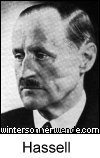 10. In the months of
February and March 1940, Ambassador Ulrich v. Hassell contacts an intermediary of Lord
Halifax
in Arosa, Switzerland. The intermediary was
Hassell's Italian son-in-law. 10. In the months of
February and March 1940, Ambassador Ulrich v. Hassell contacts an intermediary of Lord
Halifax
in Arosa, Switzerland. The intermediary was
Hassell's Italian son-in-law.
Evidence: U. v. Hassell's book Vom anderen Deutschland.
11. In spring 1940, one Dr. Josef Müller,
acting on the orders of Canaris and Halder, contacts an intermediary of the British government
in
Rome. "Via Osborne, the British envoy in the Vatican, the contact led to Lord Halifax,"
comments
Hans Rothfels, historian of the Opposition. The discussions and negotiations dealt with the coup
in Germany and had as their goal the approval of the British government. This was
given in the so-called "X-Report", and was passed on to General Halder, who in turn passed it to
General v. Brauchitsch who, according to Halder's testimony at the Denazification Court trial,
called these activities "treasonous".
Witnesses: 1. General Halder, 2. Minister of Justice Dr. J. Müller, ret'd,
Munich.
Other documentary material: 1. Jan Colvin's book Chief of Intelligence (pub.
Victor Gollancz), 2. Halder's testimony at Nuremberg, 3. Halder's testimony at the
Denazification
Court in Munich.
Numerous assassination plans and attempts against Hitler and his escorts were fostered
concurrently. One which deserves special mention is the offer made by German Generals who
promised to 'liquidate' 300,000 Nazis within 14 days in return for the promise that Germany
would not be placed under occupation. (Evidence: Sir Samuel Hoare in Gesandter in
besonderer Mission.)
These 'clever politicians' proceeded on the naive assumption that England would adopt a policy
of
severity towards Hitler, or even wage war against him, precisely at such a time as they
wished. They even thought that England would adopt this policy in order to force Hitler to step
down so that they, the 'better Germans', could take power. They were sadly mistaken,
however, for practically all they got were
empty pseudo-promises and cheap avowals of gratitude.
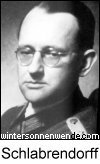 It will be useful at this point to quote the account which
one of the main participants, v. Schlabrendorff, gave in his book Offiziere gegen Hitler:
"I
myself travelled to England before the war. I called on Lord Lloyd, to whom I had access thanks
to
new connections established by our group. I informed him that a war was imminent, and was to
be initiated by means of an attack on Poland, regardless of any and all attempts at mediation.
Further, I told him that the British efforts in Russia would be thwarted because the conclusion of
a
treaty between Hitler and Stalin was imminent. In this way, Hitler hoped to guard his back, as it
were. Lord Lloyd asked me for permission to pass both messages on to Lord Halifax, who was
the
Foreign Secretary at that time. I had no qualms about that. On the same occasion I had a similar
discussion with Winston Churchill at Churchill's country retreat. When I began my expositions
with the remark, 'I am not a Nazi, but a good patriot,' Churchill smiled all over his broad face
and
said, 'So am I.'" It will be useful at this point to quote the account which
one of the main participants, v. Schlabrendorff, gave in his book Offiziere gegen Hitler:
"I
myself travelled to England before the war. I called on Lord Lloyd, to whom I had access thanks
to
new connections established by our group. I informed him that a war was imminent, and was to
be initiated by means of an attack on Poland, regardless of any and all attempts at mediation.
Further, I told him that the British efforts in Russia would be thwarted because the conclusion of
a
treaty between Hitler and Stalin was imminent. In this way, Hitler hoped to guard his back, as it
were. Lord Lloyd asked me for permission to pass both messages on to Lord Halifax, who was
the
Foreign Secretary at that time. I had no qualms about that. On the same occasion I had a similar
discussion with Winston Churchill at Churchill's country retreat. When I began my expositions
with the remark, 'I am not a Nazi, but a good patriot,' Churchill smiled all over his broad face
and
said, 'So am I.'"
Or Herr Gisevius: "The dangers to which able men exposed themselves in those days can be
demonstrated by an instance that raised a lot of dust among the ranks of the Resistance. From a
neutral location, warnings were continually being channeled to the Belgian Embassy; these
culminated in the notice given of the impending invasion. With amazing candor, the diplomat in
question cabled his government about this notice; the main part of his message was taken up by
his reasons for why this notice should be disbelieved. It originated with a high military office, he
said, which suggested that it was a red herring, intended to deceive, since otherwise the bearer of
the message
would be - a traitor."
=====================
Note
14When Hitler asked Beck, for
example, if he really believed that the French army was superior to the German, Beck referred to
his 40 years' military experience and answered that if a war were to break out, the French would
"beat the German army hollow." ...back...
   Worm in the Apple
Worm in the Apple
German Traitors and Other Influences That Pushed the World Into War:
The little-known story of the men who destroyed Adolf Hitler's Germany |
|







 The other camp of the opposition was numerically inferior, but of much greater
importance. It was made up of influential politicians
or high-ranking military officers who were
either already retired from active service and hence
felt a pent-up need for action, or who still retained
their exalted positions and were dissatisfied for reasons of insufficient recognition and praise,
and
thus also looked for additional political activity. These circles were the source of the actual
antagonists. In political respects, these included: Secretary of State E. v.
Weizsäcker, the two brothers Erich and Dr. Theo Kordt
The other camp of the opposition was numerically inferior, but of much greater
importance. It was made up of influential politicians
or high-ranking military officers who were
either already retired from active service and hence
felt a pent-up need for action, or who still retained
their exalted positions and were dissatisfied for reasons of insufficient recognition and praise,
and
thus also looked for additional political activity. These circles were the source of the actual
antagonists. In political respects, these included: Secretary of State E. v.
Weizsäcker, the two brothers Erich and Dr. Theo Kordt  (the former in a decisive position in the Foreign Office, the
latter with the German Embassy in London), Dr. Schacht and Dr. Karl Goerdeler as well as the
former Gestapo officer H. B. Gisevius, Dr. Josef Müller and the former German
Ambassador to Rome, v. Hassel; in military respects: the two General Staff army officers
Beck and Halder, the Chief of Defense, Admiral Canaris and
his right-hand man, Major General
Oster, as well as Fabian von Schlabrendorff, Major General v. Tresckow, and Colonel Count v.
Stauffenberg.
(the former in a decisive position in the Foreign Office, the
latter with the German Embassy in London), Dr. Schacht and Dr. Karl Goerdeler as well as the
former Gestapo officer H. B. Gisevius, Dr. Josef Müller and the former German
Ambassador to Rome, v. Hassel; in military respects: the two General Staff army officers
Beck and Halder, the Chief of Defense, Admiral Canaris and
his right-hand man, Major General
Oster, as well as Fabian von Schlabrendorff, Major General v. Tresckow, and Colonel Count v.
Stauffenberg. The central idea of these opponents is best expressed
in the following statement, made by the former Secretary of State in the Foreign Office, v.
Weizsäcker, the foremost 'expert' among the plotters. This was recorded in his memoirs,
and must be considered very carefully: "Before and during the War I personally always felt
morally entitled and bound to act behind the backs of Hitler and Ribbentrop to pass on to the
potential political adversary such political news as would help to keep the outbreak and the
escalation of the war in check, regardless whether these news were political secrets or not. It was
my goal to keep the potential enemy from becoming an enemy in fact."
The central idea of these opponents is best expressed
in the following statement, made by the former Secretary of State in the Foreign Office, v.
Weizsäcker, the foremost 'expert' among the plotters. This was recorded in his memoirs,
and must be considered very carefully: "Before and during the War I personally always felt
morally entitled and bound to act behind the backs of Hitler and Ribbentrop to pass on to the
potential political adversary such political news as would help to keep the outbreak and the
escalation of the war in check, regardless whether these news were political secrets or not. It was
my goal to keep the potential enemy from becoming an enemy in fact." The Head of the conspiracy was Ludwig Beck, the Chief of General Staff
himself, who had left
as early as 1938 because he could not get along with Hitler, that "megalomaniac little private
first
class". He could not take it that his politically biased memos had not received enough
attention.
The Head of the conspiracy was Ludwig Beck, the Chief of General Staff
himself, who had left
as early as 1938 because he could not get along with Hitler, that "megalomaniac little private
first
class". He could not take it that his politically biased memos had not received enough
attention. Admiral Canaris and Colonel Oster, made
preparations for a coup timed for mid-September. In an attempt to enlist foreign aid, Beck
informed the British government of the plan and its most important details. In August 1938, after
a discussion with Canaris, Beck sent the former Head of the Conservative Union,
Ewald von Kleist-Schmenzin, to London with the appropriate orders. Kleist stayed in London
from the 19th to the 24th of August 1938 and met with Sir Robert Vansittart, who informed the
government, and with Lord Lloyd and Winston Churchill.
Admiral Canaris and Colonel Oster, made
preparations for a coup timed for mid-September. In an attempt to enlist foreign aid, Beck
informed the British government of the plan and its most important details. In August 1938, after
a discussion with Canaris, Beck sent the former Head of the Conservative Union,
Ewald von Kleist-Schmenzin, to London with the appropriate orders. Kleist stayed in London
from the 19th to the 24th of August 1938 and met with Sir Robert Vansittart, who informed the
government, and with Lord Lloyd and Winston Churchill. 2. On September 5,
1938, Secretary of State v. Weizsäcker instructed Dr. Theo Kordt, chargé
d'affaires
in London, to inform the British government of the planned coup. The message was conveyed by
Frl. Susanne Simonis. The instructions were carried out in the night of
September 5-6, 1938 in a secret meeting between Dr. Kordt and the British Foreign Secretary,
Lord Halifax.
2. On September 5,
1938, Secretary of State v. Weizsäcker instructed Dr. Theo Kordt, chargé
d'affaires
in London, to inform the British government of the planned coup. The message was conveyed by
Frl. Susanne Simonis. The instructions were carried out in the night of
September 5-6, 1938 in a secret meeting between Dr. Kordt and the British Foreign Secretary,
Lord Halifax. 10. In the months of
February and March 1940, Ambassador Ulrich v. Hassell contacts an intermediary of Lord
Halifax
in Arosa, Switzerland. The intermediary was
Hassell's Italian son-in-law.
10. In the months of
February and March 1940, Ambassador Ulrich v. Hassell contacts an intermediary of Lord
Halifax
in Arosa, Switzerland. The intermediary was
Hassell's Italian son-in-law. It will be useful at this point to quote the account which
one of the main participants, v. Schlabrendorff, gave in his book Offiziere gegen Hitler:
"I
myself travelled to England before the war. I called on Lord Lloyd, to whom I had access thanks
to
new connections established by our group. I informed him that a war was imminent, and was to
be initiated by means of an attack on Poland, regardless of any and all attempts at mediation.
Further, I told him that the British efforts in Russia would be thwarted because the conclusion of
a
treaty between Hitler and Stalin was imminent. In this way, Hitler hoped to guard his back, as it
were. Lord Lloyd asked me for permission to pass both messages on to Lord Halifax, who was
the
Foreign Secretary at that time. I had no qualms about that. On the same occasion I had a similar
discussion with Winston Churchill at Churchill's country retreat. When I began my expositions
with the remark, 'I am not a Nazi, but a good patriot,' Churchill smiled all over his broad face
and
said, 'So am I.'"
It will be useful at this point to quote the account which
one of the main participants, v. Schlabrendorff, gave in his book Offiziere gegen Hitler:
"I
myself travelled to England before the war. I called on Lord Lloyd, to whom I had access thanks
to
new connections established by our group. I informed him that a war was imminent, and was to
be initiated by means of an attack on Poland, regardless of any and all attempts at mediation.
Further, I told him that the British efforts in Russia would be thwarted because the conclusion of
a
treaty between Hitler and Stalin was imminent. In this way, Hitler hoped to guard his back, as it
were. Lord Lloyd asked me for permission to pass both messages on to Lord Halifax, who was
the
Foreign Secretary at that time. I had no qualms about that. On the same occasion I had a similar
discussion with Winston Churchill at Churchill's country retreat. When I began my expositions
with the remark, 'I am not a Nazi, but a good patriot,' Churchill smiled all over his broad face
and
said, 'So am I.'"

